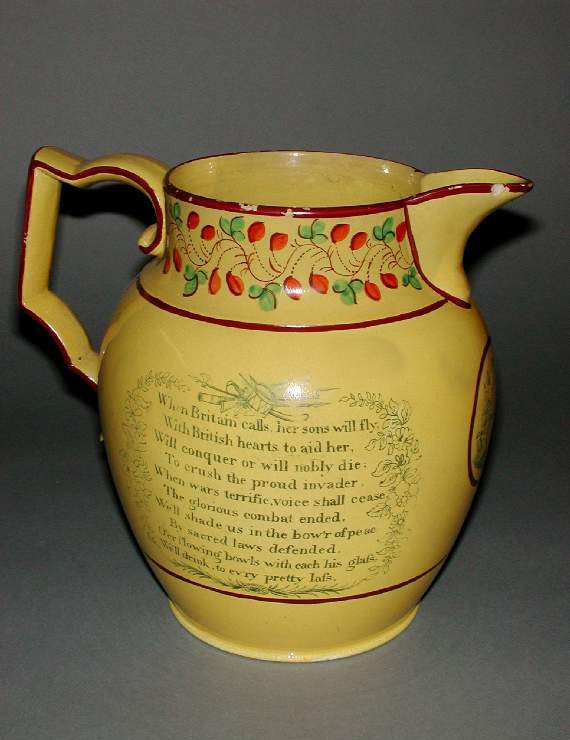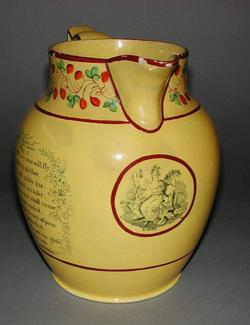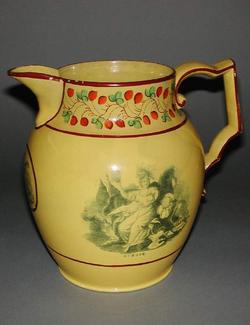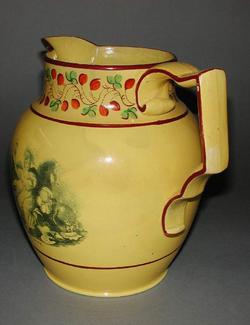Current Location: In storage
Maker(s)
Production:
unidentified English pottery
Entities
Categories
Description
Yellow-glazed earthenware, bat-printed in black with allegorical figure of Europe and verse and painted in enamels.
Earthenware, lead-glazed yellow, bat-printed onglaze in black, and painted in red, green, and dark reddish-brown enamels. Ovoid body with projecting footring, cylindrical neck with projecting lip, and angular handle with a straight back, an inward scroll at the top, and two concave curves and a slight kick at the bottom. On one side it is printed with a vignette of an allegorical female figure seated holding up a lantern, seated in front of a horse, titled EUROPE below. This is repeated smaller and surrounded by a reddish brown circle on the front. On the other side is a wreath of flowers and foliage with a military trophy at top centre, and a shield flanked by palm branches at bottom centre. Inside it is a verse: 'When Britain calls, her sons will fly,/With British hearts to aid her,/Will conquer or will nobly die:/To crush the proud invader,/When wars terrific, voice shall cease/The glorious combat ended,/We'll shade us in the bow'r of peac[e]/By sacred laws defended,/O'er flowing bowls with each his glass,/We'll drink, to ev'ry pretty lass.' Below, and round the shoulder, there is a horizontal reddish-brown enamel band. Both sides of the neck are painted with a wavy spray of red berries and green trefoil leaves. The lip is outlined in reddish-brown enamel, and there is a thicker line round the rim. There are reddish-brown lines down the sides of the handle and across the top angle.
Notes
History note: Provenance uncertain before R.H.W. Rylands, Litt. D., CBE, CH, King's College, Cambridge
Legal notes
Given by G.H.W. Rylands in memory of his mother, Betha Wolferstan Rylands
Measurements and weight
Height: 19.8 cm
Width: 21.6 cm
Acquisition and important dates
Method of acquisition: Given
(1997-10-13)
by
Rylands, G.H.W.
Dating
18th Century, Late-19th Century, Early
George III
Circa
1790
CE
-
Circa
1820
CE
Note
The verse printed on the jug appears to have been based on a traditional English song. In ‘The Universal Songster or Museum of Mirth’, a collection of traditional English songs published in 1826, the lines on the jug appear in a ballad entitled ‘My Country, Love, and Liberty!’. The ‘Universal Songster’ was illustrated by George Cruickshank, a noted caricaturist, demonstrating the close links that existed between traditional songs and the popular prints of the day, both serving as sources of entertainment and humour. The verses selected for the jug sets a patriotic and celebratory tone, emphasising drinking and merry-making. The final two lines on the jug do not appear in the song as printed in Cruickshank’s book but it is possible there were several different versions of the ballad or that the song was adapted for the jug.
Transfer printing was introduced to English pottery in the second half of the 18th century. Most early transfer-printed ware used the glue bat method. In this method, the design was engraved on a copper plate, which was then covered with linseed oil. The thin bat of animal glue was pressed onto the oiled plate and then applied to the ware. Once the bat was removed, the ware was dusted with powdered metallic oxide, which adhered to the oil, and fired to fix the design. This method was common for round-bodied vessels like this mug because the flexible glue bat can easily stretch round curving body.
Components of the work
Body
Materials used in production
yellow
Lead-glaze
Enamels
Earthenware
Techniques used in production
Painting overglaze
Lead-glazing
Transfer printing
Inscription or legends present
Inscription present: tie-on tag
- Text: "MD/c. 1810/small chip/AES 1911 £525"
- Location: Tied onto the jug on arrival
- Method of creation: Hand-written
- Type: Label
- Text: "When Britain calls, her sons will fly,/With British hearts to aid her,/Will conquer or will nobly die:/To crush the proud invader,/When wars terrific, voice shall cease/The glorious combat ended,/We'll shade us in the bow'r of peac(e)/By sacred laws defended,/O'er flowing bowls with each his glass,/We'll drink, to ev'ry pretty lass."
- Location: On side within wreath
- Method of creation: Transfer-printed in black
- Type: Inscription
- Text: "EUROPE"
- Location: On side of jug below scene
- Method of creation: Transfer-printed in black
- Type: Inscription
References and bibliographic entries
Identification numbers
Accession number: C.91-1997
Primary reference Number: 76351
Stable URI
Audit data
Created: Saturday 6 August 2011
Updated: Monday 29 April 2024
Last processed: Tuesday 13 May 2025
Associated departments & institutions
Owner or interested party:
The Fitzwilliam Museum
Associated department:
Applied Arts







